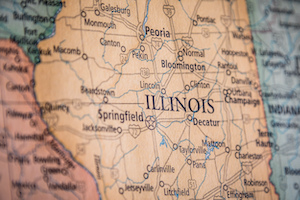 Illinois employers that have failed to register for the Secure Choice program and don’t offer their own retirement plan should take note that the Prairie State plans to step up enforcement of the program’s mandates next year.
Illinois employers that have failed to register for the Secure Choice program and don’t offer their own retirement plan should take note that the Prairie State plans to step up enforcement of the program’s mandates next year.
“We are planning to begin enforcement next year for our employers who had deadlines in 2018 and 2019,” Courtney Eccles, Director of Secure Choice, confirmed in an email to NAPA Net. Eccles noted that the Illinois Department of Revenue will oversee the enforcement of financial penalties and the expectation is that they will not begin until later in 2021, as opposed to the beginning of the year.
Subject to certain size and tenure conditions, employers that do not sponsor a company-sponsored retirement plan and have failed to enroll in Secure Choice face a penalty of $250 per employee for the first year and $500 per employee for each subsequent year. “However, we are doing everything we can to remind employers that they missed their deadlines months—if not over a year—ago and that our goal is to work with them to ensure they are up and running with the program as soon as possible,” she explained.
Eccles further emphasized that they have taken the impact of COVID-19 on Illinois employers very seriously and will continue to do so. “We had always planned to focus on encouraging compliance and giving employers a significant amount of time to begin Secure Choice or adopt their own plan—and certainly with COVID hitting this spring, we’re looking at later in 2021 to begin sending official notices,” she told NAPA Net.
Visit our state auto-IRA plan resource center!
Secure Choice Requirements
Illinois Secure Choice is a program established by the Illinois Secure Choice Savings Program Act. The law, enacted on Jan. 4, 2015, requires all Illinois employers that have 25 or more employers and have been in business for two or more years to either provide a retirement plan of their own or join the state’s retirement plan. As is the case with these state-run programs for private sector workers, this program was gradually phased in. The first wave of employers to register with the program (those with 500 or more employees) was November 2018, while the deadline for employers with 100-499 employees was July 2019, and the final employer registration deadline for employers with 25-99 employees was November 2019. However, the program subsequently allowed employers affected by COVID-19 to delay their program enrollment and paused previously scheduled compliance notices for all employers.
Employers enrolled in the Secure Choice program are required to withhold 5% of each employee’s after-tax compensation (up to the Roth IRA contributions limit, which is $6,000 for 2020), remitting the withholdings to the Secure Choice. Employer contributions are not permitted, and employees have the option to adjust their contribution rate or opt out.
“It is important to remember that all our employers receiving reminders from the Program had deadlines that were well before the pandemic, so we’re trying to strike the right balance through all of it,” Eccles stresses. “Ultimately, our goal is that no employer be financially penalized because they are in compliance with the law.”
As of May 2020, 5,535 employers had registered for the program, with 2,386 remitting payroll contributions. There were more than 62,000 funded accounts and nearly $21 million in total assets, according to the Board’s May 12, 2020, meeting minutes.
Twelve states have currently enacted laws creating retirement savings programs for private-sector workers, with Illinois being the first state to pass legislation establishing an auto-IRA program.

